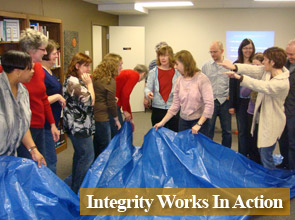My last blog was about 6 blind men and an Elephant, and I encouraged you to think of how it might apply to your organization. When I think of that parable, I am always reminded of a team that I once had the privilege of leading; “The Elephant Team”.
The Elephant Team was comprised of a number of talented individuals from different aspects of the organization, and initially, they were not really sure of whether they would form an effective team. A number of them felt that they had little in common with the work the others were doing, so they didn’t know if they had much to offer in team discussion, and, to be blunt, they didn’t want to waste their time with unproductive time consuming team meetings.
As a manager, it was my responsibility to engage each team member, find out what they would like to have from a team ideally, what their needs were in terms of safety (confidentiality, communication styles etc.) and what they were looking for from me with regards to leadership. Once I went through that process respectfully, I was then able to introduce the Blind men and the Elephant parable as a model for us to follow.
Essentially the theory behind the model is this: For an organization to thrive, it needs each of its members to both contribute, and to be recognized as contributing to its success. It needs each employee to act and feel like a true part of the overall team. A key, and often times overlooked component of this is for each team member to not only do his or her job well, but to also look for ways to understand, support and facilitate his or her team mates in doing their jobs well.
I cannot emphasize that last point enough. If you are in “admin” (for example), it is not enough for you to do your work in your own department well. For the organization to really thrive and build an exciting and positive culture, you need to be looking for ways to understand the importance and needs of people in other departments and what you can do to help them. This reasoning applies to all departments, whether you’re in maintenance, cleaning, service provision, production, sales, human resources, “I.T”, management, leadership etc., if you only understand your role and the value of your own position, you are as one of the blind men-completely missing the overall picture of what the organization is really about.
Of course this doesn’t mean that you need to be an expert in everyone’s business (I shudder at having to learn the arcane intricacies of “I.T”). It does mean that you do understand how all the parts work together for the greater good (represented by your organization’s mission statement) and that you demonstrate an interest, an appreciation, and a desire to support every other person in their unique and significant role in achieving your common goals.
My Elephant Team came to greatly appreciate hearing the perspectives of people from other departments and programs. Each person recognized that their voice and insights came from a rich history of personal and professional experience, and that the value of their contributions wasn’t based solely on a shared specific job description. In addition, bringing people together from different aspects of the organization helped foster a supportive sense of “We’re all in this together”.
So remember, neither you nor your particular job is the elephant. What you see before you is just a part. Each part is indeed important, and you can be proud of doing your part. But to really succeed and to build a truly inspiring team, you need to step back and see how your part fits with the other parts, and how you can work with them to make a really awesome elephant. (I miss you “Elephant Team”).
Thanks for “listening”.
Theo












